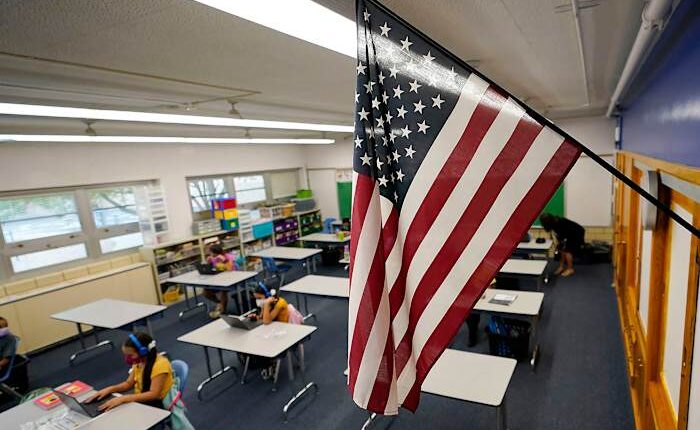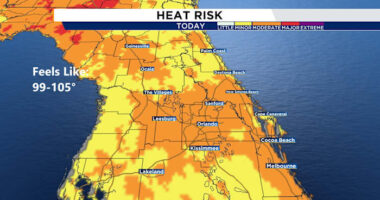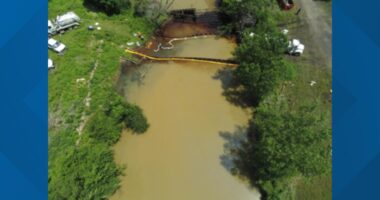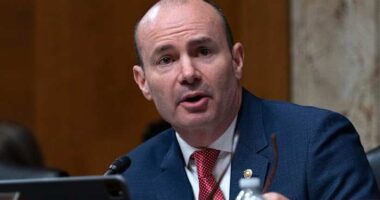
Some parents in Fresno, California, were left in a panic due to social media rumors about potential immigration raids at schools, although these rumors turned out to be hoaxes. In Denver, an actual immigration raid at an apartment complex resulted in numerous students missing school, as mentioned in a lawsuit. Furthermore, in Alice, Texas, a school official inaccurately informed parents that Border Patrol agents might search school buses for immigration papers.
President Donald Trump’s immigration policies are already impacting schools nationwide, forcing officials to address the increasing levels of anxiety among parents and students, including those who are legally residing in the country. Trump’s executive orders have significantly broadened the scope of individuals subject to deportation and removed restrictions on immigration enforcement in educational institutions.
While many public and school administrators are striving to reassure immigrant families and encourage them to send their children to school, there are instances where the opposite is happening. In contrast, lawmakers in Oklahoma and Tennessee are proposing measures that could hinder or prevent children who are in the country unlawfully, as well as the U.S.-born children of undocumented parents, from accessing education.
As they weigh the risks, many families have struggled with separating facts from rumor.
In the Alice Independent School District in Texas, school officials told parents that the district “received information” that U.S. Border Patrol agents could ask students about their citizenship status during field trips on school buses that pass through checkpoints about 60 miles from the Texas-Mexico border. The information ended up being false.
Angelib Hernandez of Aurora, Colorado, began keeping her children home from their schools a few days a week after Trump’s inauguration. Now she doesn’t send them at all.
She’s worried immigration agents will visit her children’s schools, detain them and separate her family.
“They’ve told me, ‘Hopefully we won’t ever be detained by ourselves,’” she said. “That would terrify them.”
Hernandez and her children arrived about a year ago and applied for asylum. She was working through the proper legal channels to remain in the U.S., but changes in immigration policies have made her status tenuous.
In the past week, her fears have intensified. Now, she says, her perception is “everyone” — from Spanish-language media to social media to other students and parents — is giving the impression that immigration agents plan to enter Denver-area schools. The school tells parents that kids are safe. “But we don’t trust it.”
Immigration and Customs Enforcement agents are not known to have entered schools anywhere. But the possibility has alarmed families enough that some districts are pushing for a change in the policy allowing agents to operate in schools.
Denver Public Schools last week sued the Department of Homeland Security, accusing the Trump administration of interfering with the education of young people in its care. Denver took in 43,000 migrants from the southern border last year, including children who ended up in the city’s public schools. Attendance at schools where migrant kids are concentrated has fallen in recent weeks, the district said in the lawsuit, saying the immigration raid at a local apartment complex was a factor.
The support Denver schools have given to students and families to help through the uncertainty involves “tasks that distract and divert resources from DPS’s core and essential educational mission,” lawyers for the district said in the lawsuit.
Around the country, conservatives have been questioning whether immigrants without legal status should even have the right to a public education.
Oklahoma’s Republican state superintendent, Ryan Walters, pushed a rule that would have required parents to show proof of citizenship — a birth certificate or passport — to enroll their children in school. The rule would have allowed parents to register their children even if they could not provide proof, but advocates say it would have strongly discouraged them from doing so. Even the state’s Republican governor, Kevin Stitt, thought the rule went too far — and vetoed it.
In Tennessee, Republican lawmakers have put forward a bill that would allow school districts to decide whether to admit students without papers. They say they hope to invite legal challenges, which would give them a chance to overturn a four-decade-old precedent protecting the right of every child in the country to get an education
The implications of immigration policy for U.S. schools are enormous. Fwd.us, a group advocating for criminal justice and immigration reform, estimated in 2021 that 600,000 K-12 students in the U.S. lacked legal status. Nearly 4 million students — many of them born in the U.S. — have a parent living in the country illegally.
Immigration raids have been shown to impact academic performance for students — even those who are native-born. In North Carolina and California, researchers have found lower attendance and a drop in enrollment among Hispanic students when local police participate in a program that deputizes them to enforce immigration law. Another study found test scores of Hispanic students dropped in schools near the sites of workplace raids.
In Fresno, attendance has dropped since Trump took office by anywhere from 700 to 1,000 students a day. Officials in the central California district have received countless panicked calls from parents about rumored immigration raids – including about raids at schools, said Carlos Castillo, chief of diversity, equity and inclusion at the Fresno Unified School District. The feared school raids have all been hoaxes.
“It goes beyond just the students who … have citizenship status or legal status,” Castillo said. Students are afraid for their parents, relatives and friends, and they’re terrified that immigration agents might raid their schools or homes, he said.
A school principal recently called Castillo in tears after a family reached out to say they were too afraid to go buy groceries. The principal went shopping for the family and delivered $100 in groceries to their home — and then sat with the family and cried, Castillo said.
The district has been working with families to inform them of their rights and advise them on things like liquidating assets or planning for the custody of children if the parents leave the U.S. The district has partnered with local organizations that can give legal advice to families and has held almost a dozen meetings, including some on Zoom.
___
Associated Press writer Valerie Gonzalez contributed to this report.
___
The Associated Press’ education coverage receives financial support from multiple private foundations. AP is solely responsible for all content. Find AP’s standards for working with philanthropies, a list of supporters and funded coverage areas at AP.org.
Copyright 2025 The Associated Press. All rights reserved. This material may not be published, broadcast, rewritten or redistributed without permission.
















